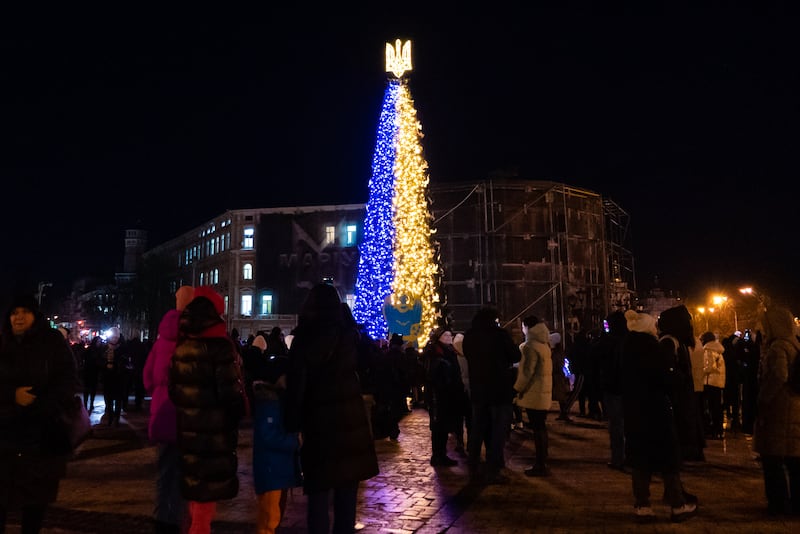Almost 1,000 faith leaders in the United States are calling for a Christmas truce in Ukraine. For historical context, they reference the famous truce between thousands of British and German soldiers in Christmas of 1914 as an example.
Indeed, Christmas is a powerful force for good for those who keep it in their hearts, and not just for one day or even one month.
In that spontaneous eruption of goodwill in the early stages of World War I, enemy soldiers briefly emerged from their trenches, shared food and drink, sang carols and even played soccer, highlighting the insanity of a war that pitted people who otherwise shared so much decency in common against each other in mortal combat.
The comparison is apt.
Surely, the war in Ukraine, initiated as an unprovoked attack by Russia last February, is at least as senseless. Thousands have died, and thousands more have been made homeless — a particularly dangerous condition as a cold winter settles in.
Ukraine’s president, Volodymyr Zelenskyy, has also called on Russian forces to begin to draw down by Christmas as the first step toward a negotiated peace. Again, he is invoking the power of Christmas for good.
But Russia’s leaders are having none of it. A Kremlin spokesman said no such formal proposal has been received, and none is on the table. Reuters reports that military analysts believe something far worse, a winter deadlock, could take hold despite fierce fighting in parts of the country.
This sad situation brings to mind the words of poet Henry Wadsworth Longfellow who, in the darkest days of the Civil War, and after having lost his wife to a tragic fire and nearly lost his son to the war, wrote the poem, “Christmas Bells,” which later was put to music, becoming a traditional Christmas carol, I Heard the Bells on Christmas Day.
Contemplating the awfulness of war and his own sorrows, he wrote, “For hate is strong, and mocks the song of peace on earth, good-will to men.”
It seemed so then, and it surely seems so in much of the world today. The Christmas holiday, at least the version the world typically promotes, cannot thrive amid the kind of suffering and death that exists in many parts of the world, including, we add, in the private lives of many people.
Surely, few in Ukraine will enjoy a tradition “holy meal,” or Sviata Vecheria, this year. Surely, those who suffer losses or the consequences of other people’s wrongs won’t see bright lights, tinsel and presents as any sort of balm. Christmas can seem a mockery against those realities.
Which is why the true meaning of Christmas is so powerful.
The birth of Jesus Christ, in poverty and in a land occupied by an often brutal foreign power, is a paradox in the eyes of the world. Many Jews at the time were looking for a Messiah who would deliver people militarily, or who would restore Israel to its former glory as a nation. Today, many people still value brute force more than spiritual power.
And yet, Jesus offers a different kind of peace that pierces even the darkest of circumstances. It exists independent of exterior conditions. Its ennobling effects transcend mortality and extend into eternity.
He came to heal broken hearts, bind wounds and empower souls. His peace is not the kind the world might feebly and temporarily offer, but one that ultimately dries all tears forever.
That is as true today as it always has been.
Longfellow understood this as he continued his poem:
“Then pealed the bells more loud and deep; God is not dead, nor doth He sleep; the wrong shall fail, the right prevail, with peace on earth, goodwill to men.”
Longfellow may have been expressing his conviction that the North would prevail in the Civil War. But the victory of the babe in Bethlehem is an eternal, just and final one. It is the true spirit and power of Christmas, and that power is expressed daily in the works of people of goodwill. It is the world’s great hope.
Of course, warring parties should call a Christmas truce. Then they should extend it, as should all who believe in the power of Christmas, year-round.
We mourn with the people of Ukraine, as we do with victims of conflicts in Myanmar, Yemen, Ethiopia, Nigeria and elsewhere. We urge people everywhere to do what they can to relieve suffering wherever they find it. That was the example Jesus set, as well. It is the duty of all. As those warring troops demonstrated back in 1914, that true spirit is the hope of people everywhere. It is the true spirit, and power, of the season.

